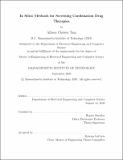In silico methods for screening combination drug therapies
Author(s)
Tam, Allison Chelsea.
Download1227512221-MIT.pdf (2.479Mb)
Other Contributors
Massachusetts Institute of Technology. Department of Electrical Engineering and Computer Science.
Advisor
Regina Barzilay.
Terms of use
Metadata
Show full item recordAbstract
Drug cocktails are an effective tool for treating many complex diseases, such as cancer and AIDS. However, developing new combination therapies is challenging, due to the combinatorial nature of the search space. Machine learning offers an efficient way to screen for promising new combinations by learning from available experimental assays. Many such models have been proposed with no leading solution. Most importantly, existing methods fail to generalize to new combinations that involve compounds not seen in the training set, requiring prohibitively large datasets to produce meaningful results. In this thesis, we propose two data-efficient models and evaluate their performance on the NCI-ALMANAC dataset, which screens two-drug cocktails on various cancer cell lines. Our first model, ComboFiLM, significantly outperforms traditional descriptor-based models, especially on more imbalanced datasets. Our second model, Bundles, solely learns from single-agent data and can be applied zero-shot to combinations. Bundles matches the performance of an oracle that is trained on combination data, and significantly surpasses similarly pretrained models when finetuned on a fraction of available combination data.
Description
Thesis: M. Eng., Massachusetts Institute of Technology, Department of Electrical Engineering and Computer Science, September, 2020 Cataloged from student-submitted PDF of thesis. Includes bibliographical references (pages 65-67).
Date issued
2020Department
Massachusetts Institute of Technology. Department of Electrical Engineering and Computer SciencePublisher
Massachusetts Institute of Technology
Keywords
Electrical Engineering and Computer Science.